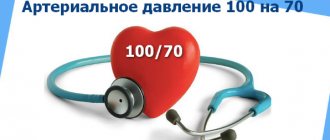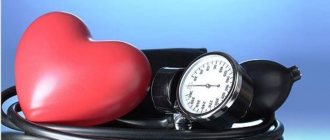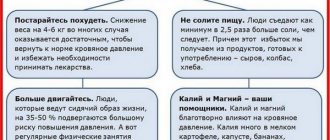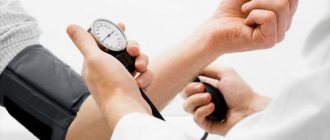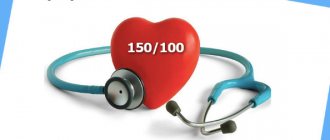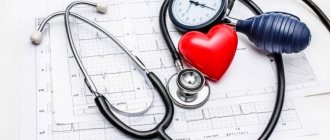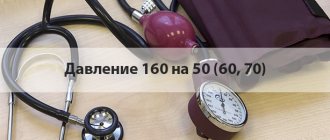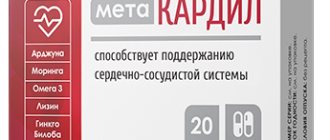Despite the accepted standards, each person has his own comfortable pressure numbers at which he feels normal. But for many, the 100/60 tonometer readings begin to frighten even if they feel well. Should you be afraid of hypotension and how can you tell if a pressure of 100 over 60 is normal?
In some cases, a pressure of 100 over 60 is normal
What does pressure 100 over 60 mean?
In medicine, the standard blood pressure is 120 over 80. A decrease in the numbers on the tonometer is called hypotension. Based on these standards, the level is 100/60 mmHg. Art. - This is a sign of hypotension. In practice, depending on the individuality of the body, there are different pressure indicators at which a person feels comfortable.
Low blood pressure is considered normal:
- in adolescence against the background of hormonal changes;
- with a thin build and short stature;
- in people involved in professional sports;
- as a one-time occurrence;
- in patients with a family history of hypotension.
Blood pressure of 100/60 is normal in athletes.
Judging by the slight difference between the medical standard and hypotension, a pressure level of 100 to 60 is considered absolute. An increase in the diastolic number is a signal indicating cardiovascular disorders.
The main signs of hypotension:
- weakness and increased fatigue;
- headache alternating with dizziness;
- drowsiness, cold extremities;
- slight nausea;
- intermittent breathing, shortness of breath;
- heartbeat, pulsation in the temples.
The listed signs of the patient's condition mean a decrease in vascular tone and weak blood flow. In such cases, the patient needs urgent consultation with a cardiologist.
If similar indicators are found in a hypertensive patient
Hypertension is a disease in which blood pressure is constantly elevated. Most often, there are cases of an increase in indicators to 140 to 90. Therefore, many people with constantly high blood pressure values are scared when they are noticeably reduced.
However, you should not panic in this case. With appropriate treatment, this sudden decrease may be within normal limits, especially if the person feels better or simply does not see their condition getting worse. If such a decrease occurs while taking medications against hypertension, you should consult your doctor. Perhaps their dosages are too high.
Causes of blood pressure 100 over 60
Hypotension also affects human health, just like hypertension. A patient with a chronic form of low blood pressure constantly experiences weakness, low performance, drowsiness and lethargy.
Factors causing low blood pressure:
- pathologies of the thyroid gland;
- psychoneurological condition;
- adrenal dysfunction;
- severe blood loss;
- VSD;
- severe dehydration of the body;
- chronic diseases of the cardiac system;
- hereditary predisposition;
- pregnancy;
- prolonged mental stress, stress or depression;
- maintaining a sedentary lifestyle.
Blood pressure may drop due to problems with the adrenal glands
Blood pressure 100/60 during pregnancy
Hormonal changes are often the cause of low blood pressure levels. Pregnant women most often experience this in the morning after sleep. Pathology blood pressure 100/60 is provoked by severe dehydration of the body due to toxicosis and vomiting in the 1st trimester. After signs of toxicosis disappear, blood pressure fluctuations disappear.
Read also: What is euphoria?
Chronic hypotension provokes a decrease in blood pressure throughout the entire pregnancy. To prevent the risk of threatened miscarriage or intrauterine fetal hypoxia - control blood pressure levels.
Secondary factors that provoke a decrease in blood pressure during pregnancy:
- increased progesterone production;
- increased load when carrying twins;
- Iron-deficiency anemia;
- individual sensitivity to changes in weather conditions;
- nervous overstrain in the form of prenatal fear.
Carrying twins lowers blood pressure levels
At the first signs of deterioration in health, it is necessary to provide the pregnant woman with complete rest. Drink a cup of warm tea and lie down on the bed. Adjust your diet - eat in small portions, add apples, bananas, and dairy products to your diet. Buckwheat, pork liver, meat and citrus fruits have hemoglobin-increasing properties.
BP 100/60 in a hypertensive patient
If a hypertensive patient’s blood pressure suddenly drops sharply, this is a very dangerous condition.
Reasons for decreased blood pressure in hypertensive patients:
- blood loss more than 800 ml;
- failure in the cardiovascular system;
- VSD;
- presence of pulmonary edema.
A pressure of 100 over 60 in hypertensive patients may indicate pulmonary edema
In case of hypertension, pressure reduced to 100/60 is a signal to call an ambulance to avoid sudden cardiac arrest. Hypertensive patients should not take pills that increase blood pressure.
Signs of a sharp drop in blood pressure in a hypertensive patient:
- the patient is confused in words, does not recognize loved ones;
- the skin turns pale and the lips turn blue;
- unsteady gait;
- the patient sweats a lot;
- the patient complains of numbness and coldness of the legs and arms.
Before the ambulance arrives, place the patient in a horizontal position and place a pillow or cushion under his feet. Release your chest to allow air to flow freely. Give some sweet tea and wrap your feet.
Blood pressure 100/60 in a teenager
With a constant decrease in blood pressure in a teenager, it is necessary to find the cause of the disease, since pathology is not the norm for adolescence.
Causes of arterial hypotension in a child:
- intoxication due to infection;
- mental or physical exhaustion of the body;
- blood loss;
- severe disruption of blood circulation in the meninges.
Mental and physical fatigue affects blood pressure in adolescents
Signs of chronic hypotension in a teenager include loss of performance, lethargy and apathy, disorientation and educational retardation, and absenteeism. There are attacks of inexplicable irritability, tearfulness, sweating and coldness of the extremities.
To normalize the condition, first of all, provide your child with proper nutrition and daily routine. Be sure to undergo a full medical examination with him to establish the causes of the pathology and possible ways of conservative treatment.
Reasons for the maximum permissible blood pressure norm
Pressure 100/60 may be secondary in nature when its drop is due to internal pathology.
With normal heart rate
Typically, a normal pulse corresponds to physiological hypotension, which is characteristic of:
- asthenics;
- inhabitants of the highlands, polar regions, tropics;
- athletes.
There is no discomfort felt.
If the pulse is 90-100 beats/minute
Tachycardia due to hypotension is the result of a decrease in circulating blood volume, which occurs when:
- dehydration of various origins;
- bleeding of various etiologies with large blood loss;
- burns;
- liver and kidney diseases;
- anaphylactic shock;
- hypoglycemia;
- panic attack.
A rapid pulse is a compensation for normal oxygen supply to vital organs or a reaction to myocardial conduction disturbances.
With bradycardia, pulse below 50 beats/minute
Low pulse with prehypotension is a common phenomenon and occurs:
- if a person is hypothermic;
- in any trimester of pregnancy;
- in athletes;
- in the elderly;
- with pathology of the cardiovascular system (cardiosclerosis, ischemic disease, weakness of the sinus node);
- poisoning;
- infections;
- hypothyroidism;
- anemia.
Another cause of bradycardia may be a hereditary predisposition or allergy.
Which doctor should I contact?
If you have a problem with blood pressure fluctuations, you should contact a cardiologist. The doctor will conduct a medical examination and prescribe conservative treatment according to an individual plan, taking into account an analysis of the actual indicators of the body as a whole.
Read also: Why mucus collects in the throat - what to do?
To clarify the reasons, visit a therapist and neurologist. A comprehensive study and diagnosis will allow you to quickly determine the correct cause of the pathology and prescribe effective treatment in accordance with the needs of the body.
Does blood pressure depend on age?
The medical community is still arguing about this. With age, our body really changes - the same vascular walls weaken, lose their original elasticity. It is logical that blood pressure will change.
Finally, with age, the heart begins to work less smoothly. And if we add here the burden of other diseases that every first person has by retirement age, the change in blood pressure looks like a completely predictable phenomenon.
Today, many doctors use blood pressure gradation according to age:
- 16-19 years old. 110/70-120/70. It is these values that are accepted as the unconditional norm.
- 20-40 years.120/70-130/80. These are already more familiar numbers in terms of understanding the norm.
- 41-60 years old. Up to 140/90 indicators will be considered normal.
- 60+. Up to 150/90 - if the numbers on the tonometer do not rise higher, everything is in order.
What happens, the body is unable to maintain normal blood pressure throughout its life? Of course, there are people with excellent health, genes, and a healthy lifestyle. Even after 60 years, any biometric program that determines biological age will show amazing values.
A person's biological parameters may be younger than his passport age! But these are rare exceptions. Most people age as soon as they reach the end of their fertile age.
To put it very roughly, nature needs us only as long as we can produce offspring. When this period ends, organs and systems “fly”, the body begins to slowly but regress. Modern achievements of science, social psychology, and valeology help a person prolong his youth as long as possible. But certain physiological changes are extremely difficult to stop.
So, WHO has been saying for many years that gradation by age is no longer indicative. Therefore, the optimal blood pressure for people of different ages will be 110/70-130/80.
What to do if your blood pressure is 100/60
During the examination, individual treatment for each hypotensive patient is selected. Self-prescribing pills or abusing coffee leads to undesirable and complicating consequences.
Important! When the tonometer readings of 100/60 are first detected, the patient must be ensured a calm state, for example, he is asked to lie with his feet on a pillow. This position promotes adequate blood flow to the brain. Let the patient drink tea and rest. After the measures taken, a one-time drop in blood pressure should return to normal.
First aid for hypotensive crisis
To quickly raise your blood pressure, take a Citramon or Pantocrine tablet. The medicine stimulates cardiac activity, thereby providing vascular tone. It is impossible to take medications constantly, therefore, to normalize the condition, it is necessary to undergo a medical examination.
Citramon increases blood pressure
If you don't have medication on hand, drink a cup of hot tea or coffee and lie down with your feet slightly higher than your head. Free your chest from tight clothing - this will ensure free access of air.
Before the doctor arrives, you should not get up or engage in any physical activity.
How to increase blood pressure with medications
The most effective and powerful medications that can quickly normalize blood pressure levels are:
- Fludrocortisone. Prescribed for dizziness and faintness.
- Niketamide. Available in the form of drops and injections. Able to quickly normalize blood pressure levels at home.
- Heptamil. A non-toxic and effective drug that has a beneficial effect on the functioning of the heart and blood vessels. Take with a sharp decrease in blood pressure against the background of a pre-fainting state.
- Epinephrine. The effect of increasing blood pressure is achieved through the effect of the drug on vasoconstriction.
Fludrocortisone will help normalize blood pressure
In case of single fluctuations in blood pressure levels, it is recommended to use lighter and less dangerous herbal-based drugs.
- Ginseng tincture. It has a tonic effect, strengthens vascular walls and increases the body's resistance. Quickly neutralizes the phenomenon of low blood pressure.
- Eleutherococcus extract. It is characterized by a mild effect on cardiovascular activity and provides an increase in blood pressure by normalizing blood circulation.
- Pantocrine. Acts on the central nervous system, stimulates blood flow in the vessels of the brain.
- Schisandra tincture. It has a general strengthening and tonic effect.
How to raise blood pressure using folk remedies
Homemade folk remedies that quickly increase blood pressure include coffee, tea with lemon, nut kernels or dark chocolate.
Tea can help raise blood pressure at home
Auxiliary folk recipes for increasing blood pressure
- Rosehip tea, drink half a glass every day. 2 tbsp. l. pour 250 ml of boiling water over the berries and let it brew for 10-15 minutes.
- A decoction of red rowan leaves. Let it brew for about an hour and add 1 teaspoon to the tea. This strengthens the vascular walls.
- A herbal infusion of nettle, chicory (root), plantain and dandelion leaves has an excellent tonic effect. Pour boiling water over the ingredients. The infused decoction is taken 50 ml 3 times a day before meals.
Read also: Table of psychosomatic diseases
A decoction of rowan leaves is an effective remedy for increasing blood pressure.
Symptoms requiring medical attention
There are quite a lot of manifestations that oblige the patient to see a doctor.
Among them:
- Severe headache or constant cephalalgia (headache) of an unrefined nature.
- Dizziness of unknown origin with regular relapses.
- Nausea.
- Vomiting without signs of relief after the next process. It has a recurrent, repeated nature.
- Fainting states of a regular nature.
- Darkening of the eyes with a sudden change in body position or rapid movements. Indicates a sharp drop in blood pressure as a result of minor physical activity. Is it dangerous.
- Heart rhythm disturbances such as tachycardia, that is, an increase in the number of beats per minute or bradycardia, the reverse process
- Pain behind the sternum or in the back on any side of varying nature and intensity.
- Dyspnea. Increase in the number of respiratory movements per minute. Considered an unfavorable sign.
- Mental status disorders (depressive and anxiety disorders).
In all cases, you should consult a doctor. If necessary, you should call an ambulance to resolve the issue of emergency correction or transportation to a cardiology hospital.
General recommendations
Additional means that increase blood pressure are maintaining a healthy lifestyle - you should not smoke or drink alcohol.
Sleep at least 8-9 hours a day. Good sleep contributes to proper rest of the whole body. It will also be useful to take a short rest for half an hour once a day to restore moral and physical strength.
To avoid problems with blood pressure, it is important to follow a sleep schedule.
To normalize blood pressure, it is worth reviewing your diet. Balance your menu with fortified foods.
Morning walks in the fresh air tone the body well. Avoid heavy physical overload and emotional stress.
To control blood pressure, measure your blood pressure with a tonometer at least once a day.
Vegetovascular istonia
Often there is a blood pressure of 100 over 60 in combination with a pulse of 110 per minute with vegetative-vascular dystonia. With this disease, a person must be able to help himself. First of all, you need to relax and lie down with your legs elevated. A tincture of motherwort or valerian, or tea with mint will help you calm down. You cannot drink coffee or alcohol in this state.
Giving up bad habits will help prevent palpitations and low blood pressure during vegetative-vascular dystonia. Smoking and alcohol negatively affect the heart and nervous system. To get rid of the disease, it is recommended to reconsider your lifestyle - the body needs a full night's sleep and a balanced diet.
The complex of therapeutic measures includes various types of therapy:
- To stimulate vascular tone, it is recommended to take a contrast shower daily.
- Exercise, brisk walking, and swimming strengthen the heart and nervous system.
- Drug treatment consists of drugs of various groups - sedatives, cardiometabolic, vasodilators and vitamin complexes.
- Phytostimulants of plant origin are taken in courses of 2–3 weeks. Eleutherococcus, ginseng or Chinese schisandra drink 20-30 drops 2 times a day.
- It is important to learn to control your emotions. If you are nervous, massage the anti-stress point located at the bottom of the chin.
Also, pay attention to the daily menu. A proper diet consists of meat, fish products, vegetables and fruits. Depleting diets sooner or later lead to disruption of the structure of the vascular wall, heart muscle and all other organs.
